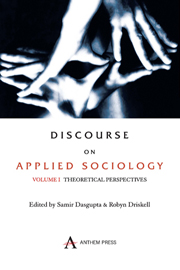Book contents
- Frontmatter
- Contents
- Preface and Acknowledgement
- Contributors to this Volume
- List of Abbreviations
- Introduction
- 1 Re-Orient World History, Social Theory and the Nineteenth Century
- 2 The Unique Complexity of Social Phenomena and the Uses of Social Science Knowledge
- 3 Unlimited Love, Compassion and Forgiveness: Acts of Moral Examplars
- 4 Theoretical Application
- 5 Applied Sociology's Need to Rethink the Tradition: Sociological Theorizing in a Global Framework
- 6 Social Analysis and Social Action
- 7 The Applied Sociologist as Craftsman
- 8 Applied Sociologists: Its Problems and Prospects
- 9 Sociology and its Application in Society: Giving Sociology its ‘Working’ Meaning
- 10 The Evolution of Sociology Back to its Applied Future
- 11 Contemporary Corporate Crime: Theoretical Perspectives, Cases & Consequences
- Index
1 - Re-Orient World History, Social Theory and the Nineteenth Century
Published online by Cambridge University Press: 05 March 2012
- Frontmatter
- Contents
- Preface and Acknowledgement
- Contributors to this Volume
- List of Abbreviations
- Introduction
- 1 Re-Orient World History, Social Theory and the Nineteenth Century
- 2 The Unique Complexity of Social Phenomena and the Uses of Social Science Knowledge
- 3 Unlimited Love, Compassion and Forgiveness: Acts of Moral Examplars
- 4 Theoretical Application
- 5 Applied Sociology's Need to Rethink the Tradition: Sociological Theorizing in a Global Framework
- 6 Social Analysis and Social Action
- 7 The Applied Sociologist as Craftsman
- 8 Applied Sociologists: Its Problems and Prospects
- 9 Sociology and its Application in Society: Giving Sociology its ‘Working’ Meaning
- 10 The Evolution of Sociology Back to its Applied Future
- 11 Contemporary Corporate Crime: Theoretical Perspectives, Cases & Consequences
- Index
Summary
This essay examines how Western social theory from Marx and Weber to Wallerstein and Frank has been based on a Eurocentric version of history. The latter not only denies real world history, but also neglects most of the human reality, especially in Asia, even during the early modern period. In doing so, this Eurocentric history and historiography, as well as the social theory derived from the same substantially distorts the experience of the West. Therefore, as Asia is now re-emerging as the centre of world history, it is high time to re-orient our historiography and social theor y and that of the nineteenth century as well, during which the West and Asia traded places in the world.
How Western Perceptions of the East Changed
Until about 1800, the predominant Western perception of the East was favourable. Europeans were attracted to and sought to learn from many parts of the Orient that were seen as civilizationally, culturally, politically, socially, economically and technologically more advanced than any part or all of Europe. Indeed, ‘Orient’, according to the Concise Oxford Dictionary of Current English, whose first edition dates to 1911, meant the following: ‘ORIENT: The East; lustrous, sparkling, precious; radiant, rising, nascent; place or exactly determine position, settle or find bearings; bring into clearly understood relations; direct towards; determine how one stands in relation to one's surroundings.’
- Type
- Chapter
- Information
- Discourse on Applied SociologyTheoretical Perspectives, pp. 27 - 78Publisher: Anthem PressPrint publication year: 2007
- 1
- Cited by



